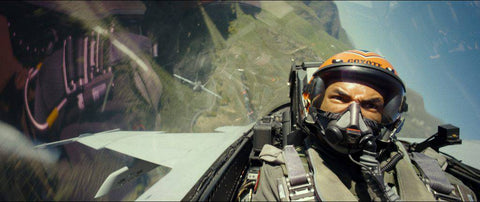
Kicking Tires and Lighting Fires With Coyote From ‘Top Gun: Maverick’

The ‘80s are back as the much-anticipated sequel to “Top Gun” (1986) flies into theaters. “Top Gun: Maverick” premiered on Tuesday with a new, diverse cast of naval aviators set to compete for spots at the United States Navy Fighter Weapons School, also known as TOPGUN.
Actor Greg Tarzan Davis spoke to Military Times, our sister publication, about carrier life, pulling G’s and portraying Lt. Javy Machado, call sign “Coyote,” a fighter pilot with something to prove.
“It was fun, and it was tough,” Davis said when describing the physical aftermath of experiencing G-force. “I felt like I’d just survived a car wreck, like I’d played 10 NFL football games.”
While the original Top Gun movie primarily was filmed in the studio, this time, the cast filmed the flight scenes in the seats of real fighter jets. The actors went through an intense training program and an adjustment period before they could begin shooting.
“Tom Cruise created this amazing program so we could adjust to being in the air,” said Davis. “We started out by flying Cessnas before moving to the next upgrade, the EA-300, then after that we moved to the jet they say is most closely related to the F-18, the L39, then to the Big Daddy itself ― the F-18.”
The objective was to increase G-force tolerance levels. Toward the end of the shoot, the cast had adjusted to a point it hadn’t imagined possible.
As filming progressed, there was a competition among the actors to see who could pull the most G’s while airborne in the various Navy jets, according to Davis.
But he says it was actress Monica Barbaro, who portrays Lt. Natasha “Phoenix” Trace, who won.
“She pulled 10 G’s at least 56 times,” noted an impressed Davis.
Carrier life and filming location
Davis said he came away from the experience with a much higher respect for the military as a whole. He spoke excitedly about the experience and of having G-force withdrawals.
Living with the Navy for 10 months gave him a window to military life he never knew, and, even though it was a short time, it informed both him and his character.
Davis spent a short time filming and living on the aircraft carrier Theodore Roosevelt. He said he had no idea what to expect.
He only was allowed to bring a small bag and wasn’t told what they’d be doing — not in filming, accommodations or meals. He was especially appreciative of the welcome he received and not being treated differently by the crew.
“It’s a different world from the glitz and glamour of my trailer,” said Davis. “I loved it. For a short time, I had a chance to become a part of the Navy.”
In the Navy
“I have so much respect for the military and the Navy overall, but being able to live that life, to live that way, to experience just an ounce of what they give, I respect it,” said Davis.
He was at Naval Air Station Lemoore, California, and Whidbey Island, Washington, for the rest of filming and said he was immersed in military life at both. The team was fully engaged in military work, schedules and even the party lifestyles, he said.
When the cast started filming in October, the first scene shot was an opening scene, an introduction to the characters at the TOPGUN school. But by the end of filming, after the experience of actually flying in the F/A-18 and other jets, they had to go back and reshoot the opening.
“I felt like we all walked with a different type of swagger,” said Davis. “By then, we had that Navy experience in blood and in our bones.”
‘Coyote’ brings diversity to ‘Top Gun: Maverick’
Of his character, Davis said “Coyote” is a person who works hard. But he feels he has to prove himself; he had to get out of the mud and work his way up from the bottom.
Other new call signs soon to be household names are Warlock, Cyclone, Hondo, Payback, Phoenix, Hangman, Omaha and Rooster.
Fans of the original “Top Gun” may remember the only Black aviator in the film was Lt. j.g. Marcus “Sundown” Williams, an F-14 Tomcat radar intercept officer or naval flight officer. This time “Top Gun” has a Black pilot upfront and in charge.
He said he’s happy that a child who resembles him can now look up at the movie screen and say, “Oh, one day I can be like him.”
“I think we’re making steps in the right direction with diversity,“ said Davis. “I am honored to be that person who can bring that diversity to the film.”
As for whether there’ll be an uptick in military aviation applications as occurred after the original film, he’s more circumspect.
“I don’t know,” said Davis. “We can’t predict that outcome, but we set out to make a great film that’s going to inspire people, whether it’s to join the Navy or to make films, I don’t know. But it’s going to make you feel something.”
Originally published on Military Times, our sister publication.
